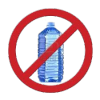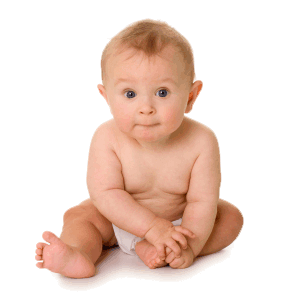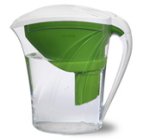Bisphenol A
BPA - A Toxic Danger that can be Avoided
Depending on whom you talk to, Bisphenol A (BPA) is either perfectly safe or a dangerous health risk. The plastics industry says it is harmless, but a growing number of scientists are concluding that exposure to BPA raises the risk of certain cancers, hampers fertility and could contribute to childhood behavioral problems such as hyperactivity.
Bisphenol A is especially dangerous to developing children even as they are in the mother's womb.
 BPA mimics naturally occurring estrogen, a hormone that is part of the endocrine system. "These hormones control the development of the brain, the reproductive system and many other systems in the developing fetus," says Frederick vom Saal, Ph.D., a developmental biologist at the University of Missouri.
BPA mimics naturally occurring estrogen, a hormone that is part of the endocrine system. "These hormones control the development of the brain, the reproductive system and many other systems in the developing fetus," says Frederick vom Saal, Ph.D., a developmental biologist at the University of Missouri.
Where is BPA Found -
Bisphenol A can be found in plastics. Those that are of concern to us are, plastic water bottles and food and beverage can linings.
 The problem is that the chemical doesn't stay in the plastic. It leaches out of the water bottle into your water, out of the baby's bottle into the baby's formula, and migrates from can liners into foods and soda.
The problem is that the chemical doesn't stay in the plastic. It leaches out of the water bottle into your water, out of the baby's bottle into the baby's formula, and migrates from can liners into foods and soda.
Ninety-five percent of Americans were found to have the chemical in their urine in a 2004 biomonitoring study by the Centers for Disease Control and Prevention (CDC).
What is the Danger -
The problem with Bisphenol A is that in fairly large doses it has been found to be safe so it has not been banned by any governmental agency. However, at the small doses you receive from your food and water it mimics hormones and that is where the danger comes in.
 The (high dose) studies didn't look at the low doses that are now proving to cause a myriad of harmful effects in animals, including chromosomal damage in female egg cells and an increase in embryonic death in mice. A follow-up to this is a study indicating a relationship of BPA blood levels to miscarriages in Japanese women," says vom Saal.
The (high dose) studies didn't look at the low doses that are now proving to cause a myriad of harmful effects in animals, including chromosomal damage in female egg cells and an increase in embryonic death in mice. A follow-up to this is a study indicating a relationship of BPA blood levels to miscarriages in Japanese women," says vom Saal.
Vom Saal counters that the studies showing BPA is safe are "profoundly flawed and in some cases exhibit outright fraud." Last year, he published a paper showing that 100 percent of the industry-funded studies, 11 in all, found no harmful effects from BPA, while 90 percent of government-funded low-dose studies, 104 in number, found harmful effects. "Among people who have actually read this literature there is no debate, just an illusion of controversy," he says.
An article from the Environental Health Perspective (August 2005) agrees. It states - As of December 2004, there were 115 published in vivo studies concerning low-dose effects of BPA, and 94 of these report significant effects. They also propose that a new risk assessment for BPA is needed based on
- a) extensive new literature reporting adverse effects in animals;
- b) the high rate of leaching of BPA from food and beverage containers;
- c) reports that the median BPA level in human blood and tissues, including in human fetal blood, is higher than the level that causes adverse effects in mice; and
- d) recent epidemiologic evidence that BPA is related to disease in women.
What can YOU do
The crazy thing is, "There are safe alternatives," Vom Saal said of products made with BPA. "There are plastic products that do not have Bisphenol A or other toxic chemicals. They can be made safely and used safely. There is no reason to keep using a chemical that has such a high potential to cause harm."
Water bottles and plastic storage containers are two of the biggest problems for most consumers. Every year millions of plastic water bottles are used. This not only contributes to the Bisphenol A toxins in our bodies, but it creates a large chunk of the trash that ends up in landfills and littering our landscapes.
A better solution is to use a BPA free reusable water bottle and a simple water filter. A good water filtration pitcher can get you clean safe water. Most bottled water companies can't say that. Tests on bottle water showed many brands loaded with toxins. Many times it was worse than tap water.
Do your Research and Make the Change
An article by Liz Szabo from USA Today, reiterates these findings. What follows are excerpts from that article
- animal tests have linked Bisphenol A, which acts like a hormone, to problems such as obesity, early puberty, hyperactivity, and abnormal sexual behavior and reproductive cycles.
- even very low doses cause profound effects on laboratory animals, particularly during pregnancy and infancy.
- the chemical can permanently rewire genetic programming before birth, potentially predisposing exposed animals to cancer.
- Bisphenol A also changes brain structure, body size and behavior in studied animals
This is just another example of the dangerous world we live in. Chemical companies are always working to make our lives better and easier and have succeeded in many ways. However, they are still businesses that are in business to make money. Not everything they do is perfect.
You need to research what you use and how it can affect you. Stay in touch with what is happening and look for companies and products that have your health and the planet's health as a concern.
Think about it.
We all make choices - It is those choices that define who we are and how we live. Make the right ones expecially when they are easy...
Cleaner, Healthier Water
 A revolutionary new water filtration pitcher system certified by the Water Quality Association (WQA) to reduce up to 99% of lead—as well as dozens of other nasty contaminants that can turn up in your water and may be harmful to your health.
A revolutionary new water filtration pitcher system certified by the Water Quality Association (WQA) to reduce up to 99% of lead—as well as dozens of other nasty contaminants that can turn up in your water and may be harmful to your health.
Cleaner, healthier water and a cleaner, healthier planet? We can all drink to that!
Return from Bisphenol A to HealthyLife Home Page

| SHOP for healthy, non-toxic, natural products from a company with a 50 year history |
|---|
Get Green Kit |
Weight Inch Loss Products |
Essential Nutrition Program |
HERBAL LAX laxative |
| AntiAging Skin Care |
Childrens Nutrition |
Soy Protein |
Women's Health |
Cleaners/Laundry Products |
Stress Relievers |
Daily Care Products |
Sports/Active Nutrition |
Heart Health |
Joint and Pain Relief |
Mood, Memory, Sleep, and Energy help: Mind & Spirit |
Digestive Health |




